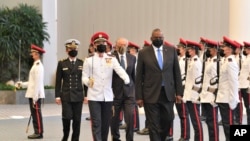The Indo-Pacific is in a position to rebuild in the wake of the pandemic and move forward to an even brighter future, in an even stronger rules-based international order, declared Defense Secretary Lloyd Austin in a speech he gave in Singapore.
“I am confident that through our collective efforts the Indo-Pacific will again rise to the challenge,” said Defense Secretary Austin. The answer, he said, involves three components, all of which are rooted in partnership.
First, the most urgent task is recovery. “We must redouble our fight against COVID and raise up a safer, healthier, and more prosperous future,” he stated.
Second, we must look further ahead and invest in deterrence as the cornerstone of American security. For decades, “we have maintained the capabilities, the presence, and the relationships needed to ward off conflict and to preserve the stability,” said Secretary of Defense Austin.
Emerging threats and cutting-edge technologies are changing the face and the pace of warfare. “So, we are operating under a new, 21st-century vision that I call ‘integrated deterrence,’” said Defense Secretary Austin. That means using existing capabilities, and building new ones, and deploying them in new and networked ways.
Third, the United States is simultaneously “working with Taiwan to enhance its own capabilities and to increase its readiness to deter threats and coercion, upholding our commitments under the Taiwan Relations Act, and consistent with our one-China policy,” said Defense Secretary Austin.
Our supportive partnership with Taiwan is in stark contrast with actions taken by Beijing that continues to destabilize the region. “Beijing's claim to the vast majority of the South China Sea has no basis in international law,” said Secretary of Defense Austin.
“Unfortunately, Beijing's unwillingness to resolve disputes peacefully and respect the rule of law isn't just occurring on the water,” warned Secretary Austin:
“We have also seen aggression against India, destabilizing military activity and other forms of coercion against Taiwan, and genocide and crimes against humanity against Uighur Muslims in Xinjiang.”
“We will not flinch when our interests are threatened. Yet we do not seek confrontation,” said Secretary of Defense Austin.
The ultimate goal is to build a free and open Indo-Pacific region that extends partnership, prosperity, and progress.
“We are confident that together,” said Secretary of Defense Austin, “we can build a better and brighter future for all of our children.”






